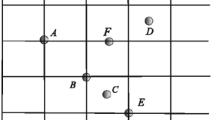Abstract
Evolutionary algorithms (EAs) are population-based general-purpose optimization algorithms, and have been successfully applied in real-world optimization tasks. However, previous theoretical studies often employ EAs with only a parent or offspring population and focus on specific problems. Furthermore, they often only show upper bounds on the running time, while lower bounds are also necessary to get a complete understanding of an algorithm. In this paper, we analyze the running time of the (\(\mu +\lambda \))-EA (a general population-based EA with mutation only) on the class of pseudo-Boolean functions with a unique global optimum. By applying the recently proposed switch analysis approach, we prove the lower bound \(\varOmega (n \ln n\,+\,\mu \,+\,\lambda n\ln \ln n/ \ln n)\) for the first time. Particularly on the two widely-studied problems, OneMax and LeadingOnes, the derived lower bound reveals that the (\(\mu +\lambda \))-EA will be slower than the (1 + 1)-EA when the population size \(\mu \) or \(\lambda \) is above a moderate order. Our results imply that the increase of population size, while usually desired in practice, bears the risk of increasing the lower bound of the running time and thus should be carefully considered.
This work was supported by the NSFC (61333014, 61375061), the Jiangsu Science Foundation (BK20160066), the Fundamental Research Funds for the Central Universities (WK2150110002), the 2015 Microsoft Research Asia Collaborative Research Program, and the Collaborative Innovation Center of Novel Software Technology and Industrialization.
Access this chapter
Tax calculation will be finalised at checkout
Purchases are for personal use only
Similar content being viewed by others
References
Auger, A., Doerr, B.: Theory of Randomized Search Heuristics: Foundations and Recent Developments. World Scientific, Singapore (2011)
Bäck, T.: Evolutionary Algorithms in Theory and Practice: Evolution Strategies, Evolutionary Programming, Genetic Algorithms. Oxford University Press, Oxford (1996)
Chen, T., He, J., Chen, G., Yao, X.: Choosing selection pressure for wide-gap problems. Theor. Comput. Sci. 411(6), 926–934 (2010)
Chen, T., He, J., Sun, G., Chen, G., Yao, X.: A new approach for analyzing average time complexity of population-based evolutionary algorithms on unimodal problems. IEEE Trans. Syst. Man Cybern. Part B Cybern. 39(5), 1092–1106 (2009)
Chen, T., Tang, K., Chen, G., Yao, X.: A large population size can be unhelpful in evolutionary algorithms. Theor. Comput. Sci. 436(8), 54–70 (2012)
Doerr, B., Künnemann, M.: Optimizing linear functions with the (\(1+\lambda \)) evolutionary algorithm - different asymptotic runtimes for different instances. Theor. Comput. Sci. 561, 3–23 (2015)
Droste, S., Jansen, T., Wegener, I.: On the analysis of the (\(1+1\)) evolutionary algorithm. Theor. Comput. Sci. 276(1–2), 51–81 (2002)
Flum, J., Grohe, M.: Parameterized Complexity Theory. Springer, New York (2006)
Freǐdlin, M.: Markov Processes and Differential Equations: Asymptotic Problems. Birkhäuser, Basel (1996)
Gießen, C., Witt, C.: Population size vs. mutation strength for the (1+\(\lambda \)) EA on OneMax. In: Proceedings of GECCO 2015, Madrid, Spain, pp. 1439–1446 (2015)
He, J., Yao, X.: Drift analysis and average time complexity of evolutionary algorithms. Artif. Intell. 127(1), 57–85 (2001)
He, J., Yao, X.: From an individual to a population: an analysis of the first hitting time of population-based evolutionary algorithms. IEEE Trans. Evol. Comput. 6(5), 495–511 (2002)
Jansen, T., Wegener, I.: On the utility of populations in evolutionary algorithms. In: Proceedings of GECCO 2001, San Francisco, CA, pp. 1034–1041 (2001)
Lehre, P.K., Witt, C.: Black-box search by unbiased variation. Algorithmica 64(4), 623–642 (2012)
Lehre, P.K., Yao, X.: On the impact of mutation-selection balance on the runtime of evolutionary algorithms. IEEE Trans. Evol. Comput. 16(2), 225–241 (2012)
Neumann, F., Witt, C.: Bioinspired Computation in Combinatorial Optimization: Algorithms and Their Computational Complexity. Springer, Berlin (2010)
Storch, T.: On the choice of the parent population size. Evol. Comput. 16(4), 557–578 (2008)
Sudholt, D.: A new method for lower bounds on the running time of evolutionary algorithms. IEEE Trans. Evol. Comput. 17(3), 418–435 (2013)
Witt, C.: Runtime analysis of the (\(\mu +1\)) EA on simple pseudo-Boolean functions. Evol. Comput. 14(1), 65–86 (2006)
Witt, C.: Population size versus runtime of a simple evolutionary algorithm. Theor. Comput. Sci. 403(1), 104–120 (2008)
Yu, Y., Qian, C., Zhou, Z.H.: Switch analysis for running time analysis of evolutionary algorithms. IEEE Trans. Evol. Comput. 19(6), 777–792 (2015)
Yu, Y., Zhou, Z.H.: A new approach to estimating the expected first hitting time of evolutionary algorithms. Artif. Intell. 172(15), 1809–1832 (2008)
Yu, Y., Qian, C.: Running time analysis: convergence-based analysis reduces to switch analysis. In: Proceedings of CEC 2015, Sendai, Japan, pp. 2603–2610 (2015)
Author information
Authors and Affiliations
Corresponding author
Editor information
Editors and Affiliations
Rights and permissions
Copyright information
© 2016 Springer International Publishing AG
About this paper
Cite this paper
Qian, C., Yu, Y., Zhou, ZH. (2016). A Lower Bound Analysis of Population-Based Evolutionary Algorithms for Pseudo-Boolean Functions. In: Yin, H., et al. Intelligent Data Engineering and Automated Learning – IDEAL 2016. IDEAL 2016. Lecture Notes in Computer Science(), vol 9937. Springer, Cham. https://doi.org/10.1007/978-3-319-46257-8_49
Download citation
DOI: https://doi.org/10.1007/978-3-319-46257-8_49
Published:
Publisher Name: Springer, Cham
Print ISBN: 978-3-319-46256-1
Online ISBN: 978-3-319-46257-8
eBook Packages: Computer ScienceComputer Science (R0)




